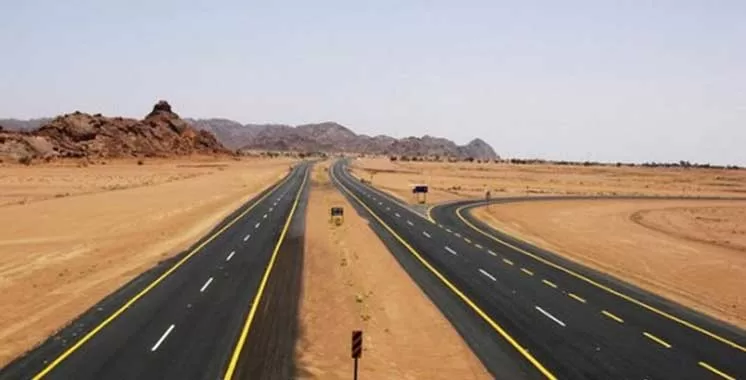Marking a major transport infrastructure development in Morocco, the last stretch of the Tiznit-Dakhla Expressway in Morocco was opened on January 10, 2025. This is also inclusive of a 114km section that links Maader which is near Tiznit to Guelmin, while passing through Sidi Ifni. This expressway was developed by Dakhla Invest.
This mega expressway project has taken approximately a decade to be completed. This final segment of the road was finished last November. However, the officials opted to keep it closed so that they could add road signs and some final touches. This 1,055-kilometer expressway is now deemed to be fully operational.
Project Factsheet
Tiznit-Dakhla Expressway Factsheet
Project Overview:
- Length: 1,055 kilometers
- Completion Date: January 10, 2025
- Budget: MAD 10 billion ($1 billion)
- Developer: Dakhla Invest
Key Sections:
- Laayoune-Dakhla: 500 kilometers, completed years ago for MAD 1 billion.
- Laayoune-Guelmim: 436 kilometers, costing MAD 5 billion.
- Tiznit-Guelmim: 114 kilometers, final section opened on January 10, 2025.
Significance:
- Economic Impact: Aims to boost trade and economic development in southern regions.
- Connectivity: Links northern and southern provinces, streamlining travel and trade.
- Population Impact: Expected to benefit over 2.2 million people across 10 provinces.
- International Standards: Built to meet international safety standards.
Development Strategy:
- Part of a larger development program for Morocco’s southern regions.
- Designed to reduce travel times, mitigate interruptions caused by flooding or sand accumulation, and improve the transport of goods
Also read: Morocco’s Largest Bridge Inaugurated by Nizar Baraka on Tiznit-Dakhla Expressway
Tiznit-Dahkla Expressway Sections: 1. Laayoune-Dakhla Section
According to the central director of the project, M’barek Fencha, revealed to Le360, which is a Moroccan news outlet that this new road comprises of three major sections. “The Laayoune-Dakhla was completed some years ago at a cost of 1 billion dirhams,” he mentioned.
2. Laayoune-Guelmin Section
The second section of the road links Laayoune to Guelmin. This section spans a distance of 436 kilometres and was constructed at a cost of $500 million. It’s construction was quite expensive since it involved some complex engineering works. They had to construct several bridges over rivers passing through rough terrains and obstacles.
3. Tiznit-Guelmin Section
This newly opened section of the expressway running from Tiznit to Guelmin completes the mega highway project. The Tiznit-Guelmin road section will serve a critical need. It will link both the northern and southern provinces thereby streamlining both travelling and trading activities.
King Mohamed VI set this $1 billion project in motion in the year 2015. This expressway project is deemed to be in line with the international safety standards. Furthermore, it is part of a larger development program for the southern regions of Morocco.
Similar Projects
On similar projects, the new Rabat-Casablanca expressway project will be completed in the year 2030. This is according to Nizar Baraka, who is the Minister of Equipment and Water.
Also read: Morocco’s 1,300 Kilometer High Speed Rail to be Constructed by 2040
This expressway project is set to link Casablanca and Rabat therefore making travelling between the two cities easier. Additionally, this expressway will pass near Hassan 2nd Stadium which is being built in Benslimane. This is indeed a major added value that will enhance the stadium poised to the largest in Africa.
Moreover, Baraka also revealed another new freeway project that will be constructed between Fez and Marrakech. Also, this road will pass through Beni Mellal and Khenifra, he revealed.
The Department of Public Works has set plans of expanding the overall motorway network of Morocco in the coming years. This will be achieved at a set budget of $2 billion.

Leave a Reply